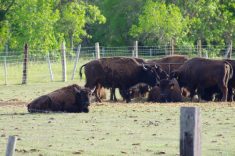When you’ve been in the ag journalism game for almost 40 years, few things surprise you.
And, yet, on June 21, the Washington Post published a farm-based story that made even this greybeard marvel at how tone deaf and superior sounding rural politics has become.
Even more startling was the reader reaction to that growing tone-deafness. Within four days of the piece being published, nearly 5,000 readers posted online comments soaked with contempt and sarcasm for the featured farmers.
In fairness, the farmers and others quoted in the story only related what almost every farmer and rancher has thought or said this troubled year: it’s getting tough out here. How they said it, though, undermined almost every ounce of empathy readers might have had.
Read Also

Trade uncertainty is back on the Canadian national menu
Even if CUSMA-compliant goods remain exempt from Trump’s new tariffs for now, trade risk for farmers has not disappeared, Sylvain Charlebois warns.
It began with one farmer noting “This trade thing” — Mexico, in this instance — “is going to kill us.” Next, more tough-minded, toughly worded quotes tumbled out:
- The latest farmer bailout package, estimated at a staggering US$16 billion, “is like putting a Band-Aid on a bleeding artery. It’s not going to save anybody.”
- “Trump’s going to do right by us… and get this straightened out.”
- “I always say the West Coast and East Coast can each be a country and the rest of us will be just fine.”
Then came the swift and searing replies. Here’s a sampling of the more printable comments:
- “They disdain the coastal elites who pay their bills. They hate socialism that they rely on. They complain about taxes they barely pay. The sheer ignorance of thinking they feed us (when) it’s us feeding them.”
- “Coastal elites? It might surprise those farmers that the majority of the folks on the coasts don’t live in penthouses and make millions a year. I don’t pretend to know what it takes to be a farmer. Please don’t assume you know what it’s like to live in a city on either coast.”
- “I’m kinda wondering where the heck they think the rest of food comes from, like food that isn’t corn, wheat or soybeans.”
In contrast, the number of farmer-defending comments were too few to count.
So what’s going on here?
Part of it is simply piling on. Angry, Trump-bashing non-farmers see a chance to vent against “rich” farmers.
The bigger part, though, is more troubling: farmers and ranchers have a growing problem with today’s younger, better-educated, more influential generation of eaters. These eaters are unafraid to challenge Big Ag’s views and the scornful pats on the head — rather than real answers — they receive to their serious questions.
As such, the almost automatic, guaranteed political support farmers and ranchers once received from the public is quickly draining. Political divisions, now steeped in today’s unbridled rhetoric, have split most of the remaining support along widening rural/urban lines.
Farmers and ranchers are, of course, free to reject the Post story as liberal or elitist and its reader comments as biased or uninformed. What can’t be dismissed, however, is that almost 5,000 people reacted angrily to a story told through the voice of farmers.
If that means anything, it means that agriculture has a bigger problem than either weather or trade, and this one won’t be solved by turning inward or telling others to butt out.
The Farm & Food File is published weekly throughout Canada and the U.S.















